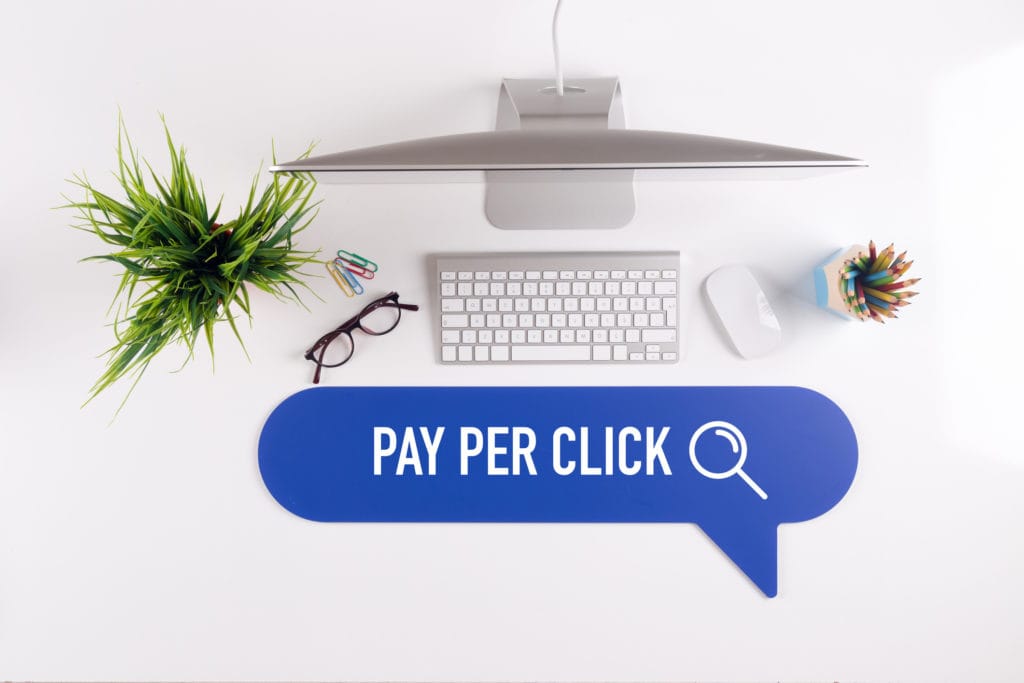If you’re not working in the digital marketing space, it’s easy to see why you may believe investing in pay per click, or PPC, paid search campaigns could serve you better than investing in search engine optimization, or SEO efforts. The truth is, they both serve their purpose in marketing your business, and the best digital marketing strategies include both. Let’s break them down and take a closer look at why you shouldn’t choose one over the other.
Overview
What Is Paid Search?
When you’re investing in paid search, you’re paying a certain amount of money each time someone clicks one of your ads that display in the search engines for certain keywords. These paid ads always appear at the top of the page, above the organic listings that are influenced by SEO.
It involves using the Google Keyword Planner Tool to determine the value of each possible keyword you want to run ads for. Certain keywords that have a high search volume are highly competitive, meaning that if and when your ad shows, you’ll pay a hefty penny for each one of those clicks. (And just because someone clicks doesn’t mean they will make a purchase, so that’s something to keep in mind when looking at those costly phrases.)
The Keyword Planner tool will help you see the estimated cost per click, and you can decide what keywords you want to use, along with the details of the campaign within Google AdWords. If you’re not too sure about handling it all on your own, the team here at Sachs Marketing Group can assist you in setting up and managing your campaigns – choosing the best keywords and budgets for your goals.
What Is SEO?
SEO, on the other hand, focuses on using a variety of methods to have your website’s content rank highly in the organic search for any given keyword. The traffic from organic SEO efforts is free, though unless you’re an expert yourself, or willing to spend time learning (and there’s a lot to learn!) you’ll need to pay someone to help you with the various stages of SEO – from the technical side of ensuring your website is well-coded and fast loading, to the content creation and marketing, link building, and social media.
Content is a huge part of SEO because Google expects users to receive high quality results that suit their needs. The average length of a #1 ranking page in a Google query is 1,890 words. And it pays off to have a content marketing strategy, as data shows it leads to a 2,000% increase in blog traffic and 40% increase in revenue.
Why You Need Both
With organic traffic from search engines from SEO, you have a number of benefits.
Branding and Awareness
Visibility in search engines around your targeted keywords puts your business in front of potential customers much the same way advertising would. That same visibility around commercial terms and informational queries related to your business helps you build trust and credibility with searchers as they conduct the research that leads to a purchase. It allows you to become an authority on industry topics.
Trust and Credibility
When your site shows up in organic search results, you can improve your perceived credibility with people who are looking for your services. Many users skip the ads and go to the organic search results because they trust them more. The visibility gives your business a stamp of approval. If you can strengthen that with review and reputation signals, you’ll get even more benefit.
Cost Per Click
The traffic from SEO is free – aside from the money you’re spending to get help with it. You’re not paying a direct charge for each click. SEO isn’t cheap or easy, but over the long term, it is more cost-effective than other marketing tactics. It helps deliver brand awareness and relevant traffic to your website at a lower overall cost.
Return on Investment (ROI)
SEO, when done correctly, can have a better ROI compared to various forms of paid media, and can improve upon your PPC efforts.
Sustainability
Organic traffic won’t stop the second you stop paying for it, but PPC traffic will. Organic traffic can help sustain your business if and when you must reduce marketing spend.
Better Click Through Rate (CTR)
More users click organic results than they do ad. There are some exceptions to this rule, of course, but typically you’ll get more traffic from a highly ranked organic listing than an ad.
Strategic Advantage
Visibility in organic search isn’t easy or quick, which is a double-edged sword. Establishing yourself in organic search results ensures your competitors can’t just buy their way in – as long as you’ve done things the right way. If your competition is relying on paid search, you have the advantage. That said, it can be difficult if you’re competing against long established players, so you may need to adjust strategy.
Scope
Because of the volume of queries every day, if you want to maximize scope, you’ll need strong organic visibility. You won’t want to pay for all kinds of clicks or advertise all the content on your website.
PPC Considerations
PPC offers the benefit of laser targeting. You can target people who you know are most likely interested in what you’re selling, and those who are far enough along in their journey to consider making a purchase from you. Google provides the ability to offer visual shopping ads, known as product listing ads, that helps users see what they’re clicking on, which can improve click through rate because that feature isn’t available in organic search. Consumers who click on a Google search ad before visiting a brick-and-mortar store are 27% more likely to make an in-store purchase, and on average spend over 10% more.
According to Google, businesses generally earn an average of $2 for every $1 they invest in search ads. Because ads dominate the above the fold space on the screen, users will see the ads even if they choose to scroll past them. Desktop users see four ads above organic results, while mobile users see three. And, because of the tight budget control options, you are in great control of your spending. You’ll set a maximum amount you’re willing to spend every day, and go from there.
However, because PPC stops as soon as you stop paying for it, you can’t rely on it as a steady lead generation machine unless you have an unlimited amount of money to continuously invest.
That’s why it’s wise to invest in both PPC and SEO initiatives, and align your strategies. PPC is a great way to start driving traffic and generating leads when you’re a brand new business and need to work on building brand awareness and credibility while your SEO efforts are working for you. Search ads can increase brand awareness by 80%. Where SEO takes time to generate results, you can start getting instant traffic and benefits from PPC.
Neither SEO nor PPC are “set and forget” options. Both require skilled management and optimization to ensure they are working for you as hard as they can be. If you have to choose between investing in one or the other at first because of financial constraints – it’s hard to give you a clear cut answer. It really comes down to the unique situation of the business at hand.
If you’re a hyper-local business with little competition and you only need a few leads a week, a little effort in the SEO area could give you good visibility in the local organic search results. But, a new e-commerce store that’s competing against big players such as Amazon and eBay and department stores, is going to struggle, in the short term, anyway, to gain traction in organic results. It really depends on how quickly you need leads, whether you’re looking at the long game, the competition in local search, the cost per click in paid search, and what you have in terms of website authority.
If you need help making that decision, get in touch with us today. We can help you develop a digital marketing strategy that clearly identifies both short-term and long-term goals, to help you choose how to make SEO and PPC work together for your company. Ideally, it is best to work with both strategically, so they can support one another.
Contact us today to get the conversation started!










